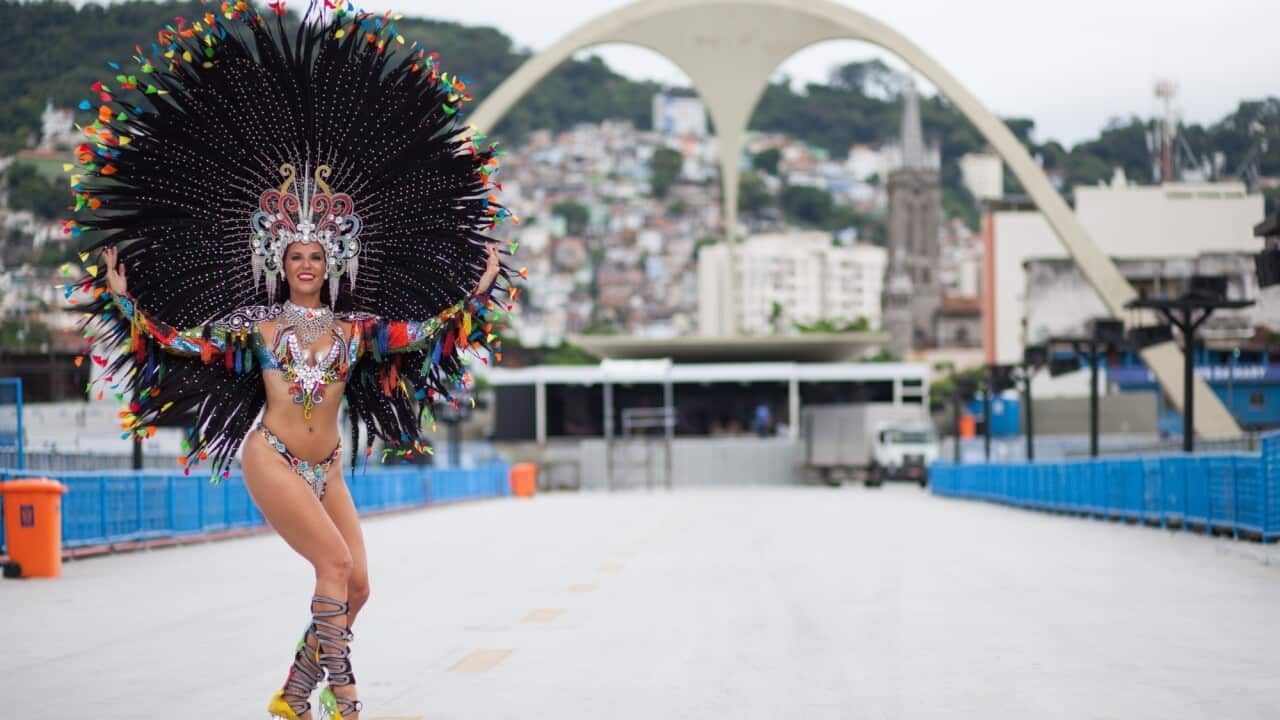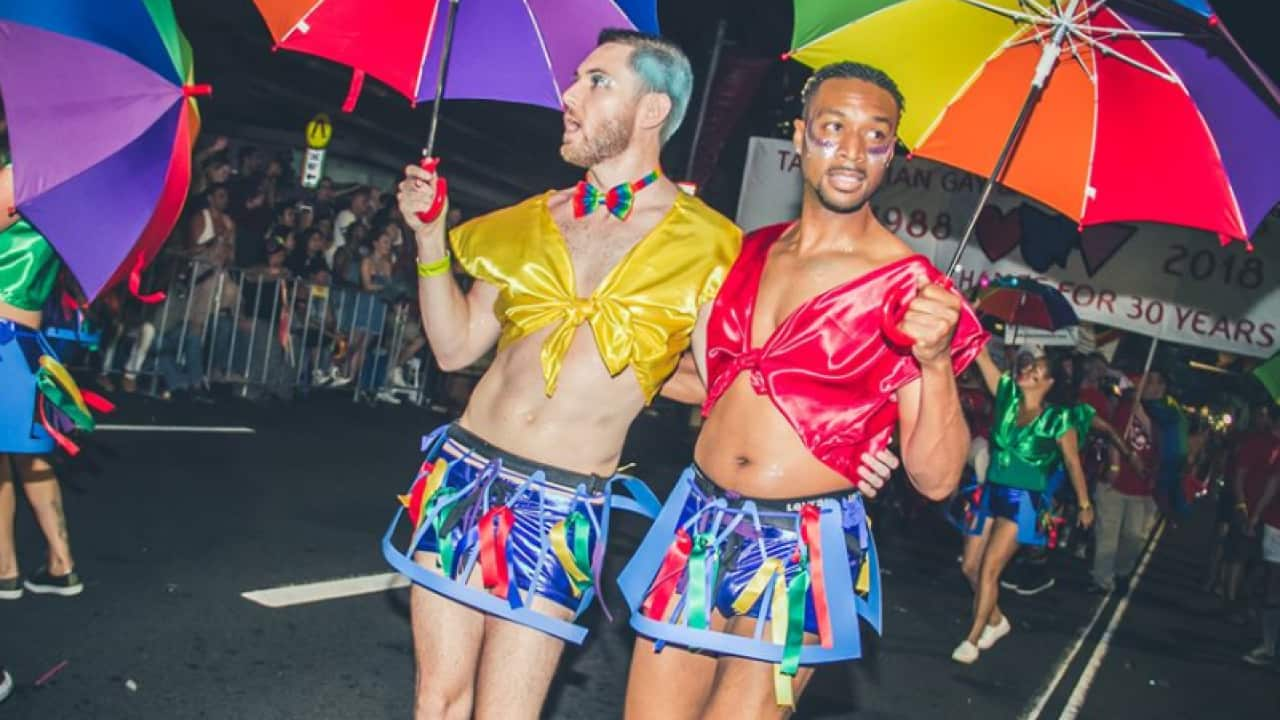It is known as one of the biggest shows on the Earth, and for Brazilians, the Carnaval is what life is all about; a celebration of the country's rich culture through exhilarating drumming and sensuous dancing.
At this time of the year, in a pre-COVID World, thousands of Carnaval seasonal workers would be busy preparing for the processions in São Paulo and at the Sambadrome in Rio de Janeiro.
Highlights
- Brazil is among the worst-hit countries by COVID-19, with 130,000 deaths and 4.2 million infections
- With tourism representing eight per cent of the country's GDP, the pandemic has had a significant impact on those earning a living through occupations linked to the Carnaval
- Samba students in Melbourne are supporting Brazil's sambistas by engaging them for special online lessons

The sambadrome, designed by Oscar Niemeyer, features more than 50,000 performers from 13 samba schools in Rio's annual samba competition before an estimated crowd of 85,000 people Source: Wikimedia Commons
While Brazil's samba communities grapple with these unprecedented difficulties, Sophie Contreras - a samba teacher in Melbourne - has found a way to play a part in what she says is "giving back what samba gave to me." 

Sophie Contreras in Rio: “There's really a feeling of community in the samba world we can all help, be there for each other" Source: Silvio Barroso
Born in Melbourne, the daughter of an Australian father and French-Spanish mother, Ms Contreras fell in love with samba eight years ago. Since then, she has visited the South American country many times, trained hard, danced to her heart's content and became a passista – one of the scantily dressed dancers leading the processions.
She also started her samba school in Melbourne where she teaches classes of 30-40 women of all ages, body shapes and cultural backgrounds.
"Samba is for everyone," she tells SBS Portuguese.  Seeing her beloved samba community all but decimated by the coronavirus, Ms Contreras decided to do something to help.
Seeing her beloved samba community all but decimated by the coronavirus, Ms Contreras decided to do something to help.

Sophie and her samba students in Melbourne: "We are all passionate about samba and take care of each other" Source: Supplied
The idea is simple: every month, Ms Contreras runs masterclasses with Brazilian artists and invites her students to attend the international workshops, from their living rooms, and learn new samba steps.
"The [sessions] are very popular, the artists are paid, and all the proceeds go to food donations, care packages, to people in need," she said.
"As a passista, I saw the community in the good times, now with the coronavirus people there don't have work, can't feed their families, they are really suffering. The samba schools act like a community hub; they look after the people who don't have much. "Because the community openly invited me as a gringa to come and dance in their Carnaval, which is something very sacred for the sambistas to share their culture. Now we are in Australia, a very lucky country, it is my opportunity to share what I have here in Australia with the Brazilian community who have given me so much in the past. They don't have JobKeeper there."
"Because the community openly invited me as a gringa to come and dance in their Carnaval, which is something very sacred for the sambistas to share their culture. Now we are in Australia, a very lucky country, it is my opportunity to share what I have here in Australia with the Brazilian community who have given me so much in the past. They don't have JobKeeper there."

Zoom classes are connecting samba communities in Brazil and Australia Source: Supplied
Gabriel Castro says the donations are going to the Formiga community, where the Tijuca samba school is located, and the surrounding suburbs. "The majority of the population in Rio lives off an informal economy; they eat with what they make on the day, if they don't work, they don't eat," he says.
"Sophie's help and other donations from around the globe are assisting our people. We also extended some care packages to the people of Vila Isabel, another samba community." One of the artists currently working with Ms Contreras, Marcus Prado from Sao Paulo, has used the donations from the Australian samba students to prepare and distribute meals. His group of volunteers is now delivering 200 meals every week to disadvantaged communities in Sao Paulo, including homeless people and families affected by domestic violence.
One of the artists currently working with Ms Contreras, Marcus Prado from Sao Paulo, has used the donations from the Australian samba students to prepare and distribute meals. His group of volunteers is now delivering 200 meals every week to disadvantaged communities in Sao Paulo, including homeless people and families affected by domestic violence.

A group of volunteers are now delivering 200 meals every week to disadvantaged communities in Sao Paulo, including homeless people and families affected by domestic violence Source: Supplied
"The zoom classes bring us together. I know some students who came here with Sophie to this year's Carnaval in February. Through the computer screen, we can connect and forget we are so far apart. We go through our classes as there was no COVID out there. We feel immense gratitude," says Mr Prado.
Sophie Contreras says the workshops are popular because the students are excited and the sambistas keen to share their knowledge.
"They are happy to see that so many people love samba in Australia. They are sharing their passion and also earning money as they are not earning the same money right now they were earining before. Samba is empowering, it makes feel people free, nothing is more important than the movement of freedom, and I think right now this is what we need once a week," she says.
Also from SBS Portuguese

Australia's ‘Samba Queen’ to make her debut in Rio de Janeiro's 2020 Carnaval











